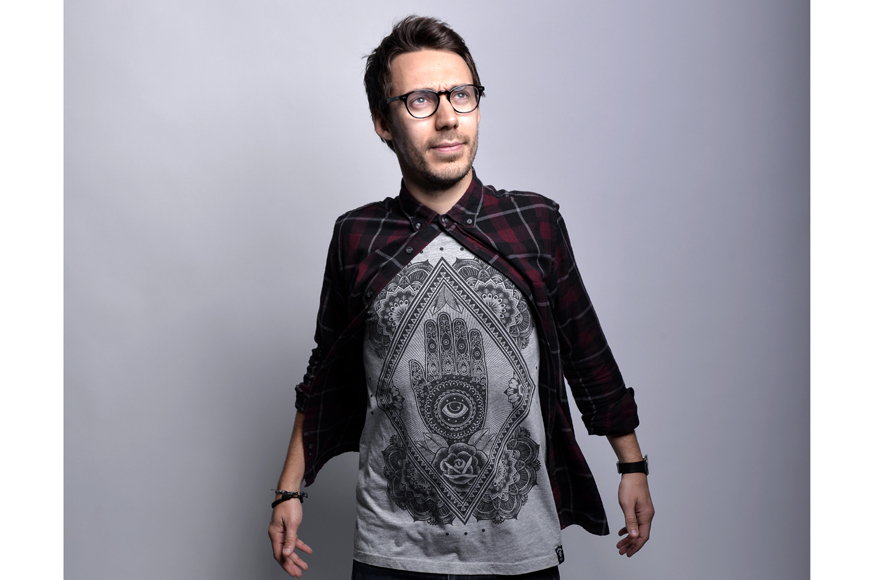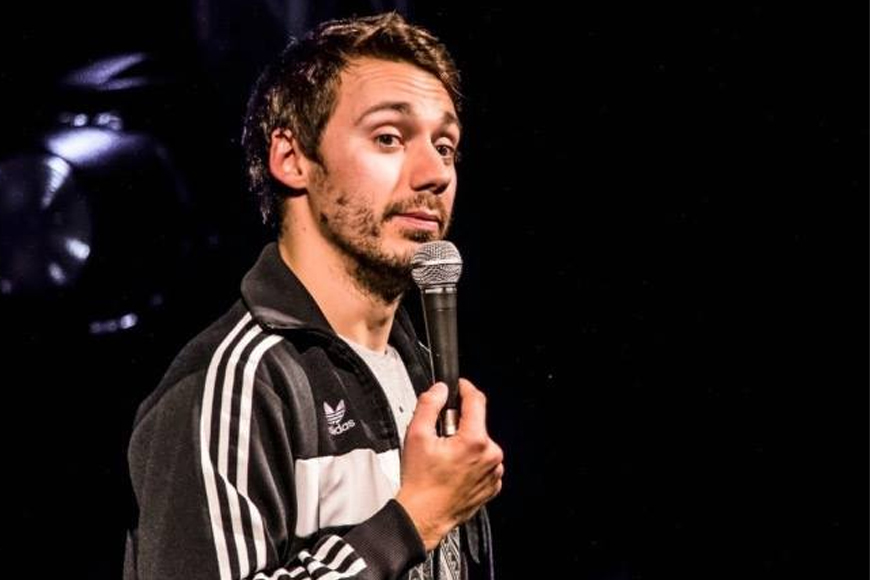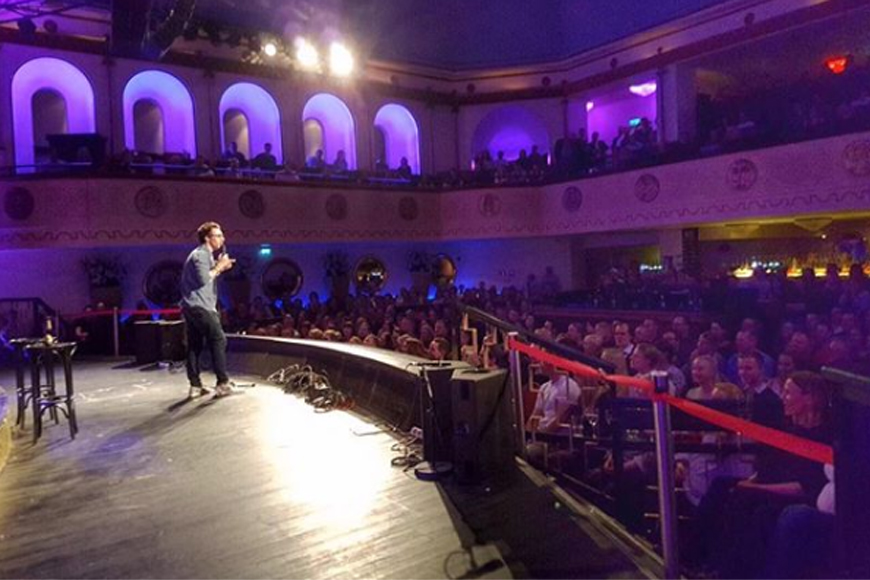Tom Deacon has become the friendly face of the Elite Series and a household name within the UK esports scene, thanks to his role as desk host at Gfinity.
However this isn’t Tom’s native industry. The funny and quick-witted host we know and love debuted his desk hosting skills during the first season of the Elite Series, but previous to this he worked in radio, comedy and on YouTube.
Going from the comedy scene to working in the esports space seems quite a sizeable leap, so Jamie Wootton decided to catch up with Tom and discover what fuelled his transition into the scene – and what his experience of working in the industry has been like so far.
Esports News UK: What fuelled your transition into esports? Going from full-time comedy to acting as the desk host at Gfinity is quite a leap so what made you make the decision?
Tom: I love the phrase ‘fuelled your transition’ as I think it sums up moving forward perfectly. I had finished a Capital FM breakfast show that I’d done for the last 18 months and was back to performing full time in comedy.
I had in fact written a show ready to take to Edinburgh Festival to showcase and then hopefully tour, however when something like hosting an esports show comes along you don’t have to think too hard about moving forward in a new exciting direction.
That’s what all of my work in the past has been about, from stand-up to radio, to presenting to having my own show on Copa 90. I’ve always wanted to be working with people who are passionate about what they do, so the first time I met the people at Gfinity I was like: ‘This is for me!’
In Season 1 of the Elite Series we had three games, Rocket League, SFV and CSGO, all of which I’d played and was keen to meet and be part of the show. I was also fascinated to meet the players.
Why esports? Well quite frankly I understood what it was and had seen a fair amount online. Having said this, I never thought my love of gaming could take me into this world.
ENUK: Do you think your witty, high energy character makes being a host easier and if so, why?
Tom: I’m not sure it makes it easier, but it’s me being natural so I’ve managed to make it work for me. I’ll be honest I’ve never hosted something like the Elite Series before. Things such as having an autocue talk back in my ear were alien however, what I did have was a collection of things that have helped me make the transition.
Through working in radio, for instance, skills such as presenting, learning lines and being used to the cameras have prepared me for the Elite Series. Also, through stand-up you get used to things going wrong and learning how to deal with it live.
I believe being a good host is bringing everything together. I’m the person who helps the directors do what they want, and I help the people in front of the camera do the best job they can do. I make things run as smoothly as I can. I also stay calm when things go wrong, it brings out my best poker face!
The team will be telling me of a problem and why there’s a slight delay and I have to keep that smile that says everything is okay. I’d like to also think that I help the regular viewers and new viewers feel welcome.
The best way I can describe it, is I’m like the host of a house party. However, I don’t host the show to be noticed. That may sound odd, but my job is to host not entertain. The casters, analysts and most importantly the players entertain. I merely make sure that happens.
“Before taking the job, myself and a few others thought about how I would be received by the gaming community. One thing I knew I had was the ability to host, but maybe not as a usual esports host. I’ve learnt from many in the community. Working with Thorin in CSGO taught me a lot, and I’m grateful for the times I worked with him.”
ENUK: How do you think both Gfinity and yourself, as a desk host and someone working in the industry, have grown over the time you’ve been a host for the Elite Series?
Tom: I don’t think it would be out of place for me to say that I believe that the whole project has come along brilliantly since day 1. I was very passionate to be part of a competition in the UK, that ran for 8 weeks or so, that could give gamers here a chance to compete and make a name for themselves.
Just watching the journey of some gamers who have come through the Challenger Series and competing at this high level has been fantastic. As a host I have felt more and more comfortable doing what I do. That’s come about from having challenging moments and learning from them.
Working with Mr Esports himself Thorin in CSGO taught me a lot, and I’m grateful for the times I worked with him. Now that we’re streaming from Facebook live on every show, I think this shows the commitment from Gfinity to spread the good word of esports and making these gamers superstars around the world.
ENUK: Although I’m sure you’re happy fulfilling your current role as host at Gfinity, can you see yourself in different roles within esports or at different gigs in the future?
Tom: I love my job. I get such a buzz from being a part of it. Chatting tactics through with the analysts on the desk, meeting the fans who come to the Arena and of course getting to know the players.
One of the most exciting adventures for me with Gfinity has been to host the F1 Esports event we had last year. Being on the grid for the final and seeing the opportunity for esports to make a name in the conventional sports world was an honour.
If there was something I’d love to do, that would be to host on other games like Madden and Battlefield 1, but also any new game where I get to learn about it and like any gamer fall in love with the game.
I also wouldn’t mind casting. I think it’s such a brilliant skill when a caster can bring to life even the quietest of games.
“I’m like the host of a house party. However, I don’t host the show to be noticed. That may sound odd, but my job is to host not entertain. The casters, analysts and most importantly the players entertain. I merely make sure that happens.”
ENUK: You mentioned Thorin. Have you taken any inspiration or looked at other hosts in the industry before presenting the Elite Series, or have you used your experience and intuition from being a comedian and keeping an audience entertained to get the job done?
Tom: Before taking the job, myself and a few others thought about how I would be received by the gaming community. One thing I knew I had was the ability to host, but maybe not as a usual esports host. I’ve learnt from many in the community.
I watched Alex ‘Machine’ Richardson and had the pleasure of working with him to admire the way he conducts himself, he’s a great guy! I also watched Jimmy Conrad with his FIFA work, I know Jimmy from my Copa 90 days, as well as Spencer Owen.
I watched old interviews from Julia Hardy to see how she works too. I’ve watched everyone I’ve worked with before – mainly because I like them but also due to respecting their work. I did watch a bit of Paul ‘Redeye’ Chaloner too.
In a nutshell I watched a few people and felt comfortable that I could do a job, luckily people have liked it so far; so long may that continue!
ENUK: Assuming you’ve heard about Faceit hosting the CSGO Major in the UK for the first time ever in September, and ESL UK hosting a Dota 2 Major in May for the first time ever in the UK, do you think having two huge esports tournaments here will positively impact the Elite Series’ future seasons and bring more opportunities to the local scene?
Tom: I hope so. I know that there can be fear factor in so-called rivalries in the industry, you get them in many walks of life which is a shame, because I feel the more esports grows the more opportunities there will be for everyone.
I believe strongly in the way Gfinity produces each show, in terms of production and the people working on each show. I hope this high-quality spreads through esports, because this way the fans will benefit.
Many thanks to Tom for agreeing to being interviewed and offering a unique insight into his transition from being a full-time comedian to becoming a desk host at Gfinity. More about Tom can be found over at: www.twitter.com/TomHDeacon
Jamie has been following competitive Counter-Strike for roughly four years and has fallen in love with esports ever since, slowly branching out into other titles and learning more about the industry. He has recently started an esports degree in London.
“I started playing CSGO when I first got my own PC and haven’t really stopped ever since," he said. "After playing more competitively I opened my eyes to esports and have been doing my best to learn as much as possible about both the competitive side within CSGO and the business side across the industry as a whole.
"Much of my work so far has consisted of interviews, however I hope to branch out in the future and write more content about Counter-Strike."




